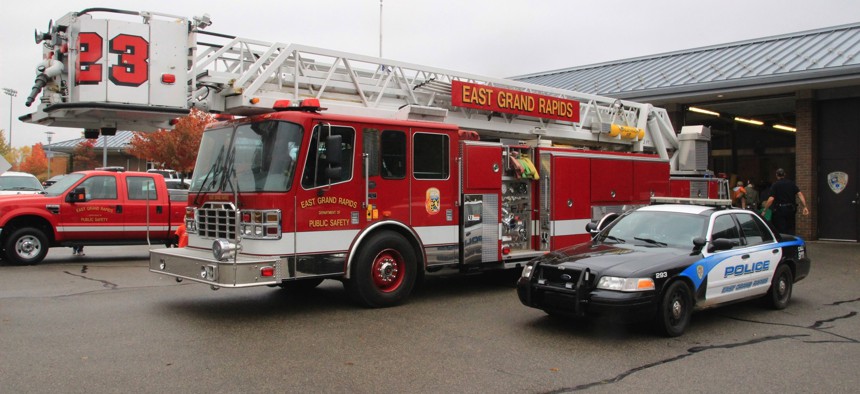Connecting state and local government leaders
Merging police and fire departments into a unified agency can be difficult. But 30 years after East Grand Rapids, Michigan, did it, the effort has paid off, according to the city manager.
EAST GRAND RAPIDS, Mich. — Public safety are two words that can keep a city manager up at night.
Consolidating police and fire departments into a cohesive public safety department is no easy task. It takes time, money and a lot of work. First, you have to get buy-in from elected leaders and police and fire personnel, including their unions—and it can take a lot of convincing to get stakeholders to embrace the “no pain, no gain” philosophy required for adopting the public safety department model.
You then have to work hard to cross train firefighters and police officers to ensure the end result is a department with public safety officers who can respond to police and fire calls in a safe and efficient manner. Cross training can be met with resistance, as some firefighters and police officers want to stick with what they know rather than learn the other’s job.
In East Grand Rapids, Michigan, all of this was the case 30 years ago when we merged our police and fire departments to create a Public Safety Department. Despite the aches and pains of change, it’s clear that our city and our nearly 11,000 residents are much better off with fully cross-trained officers on the streets.
Chief among the benefits is our ability to provide faster and more efficient police, fire and medical first responder services. We have the fastest response time in our county for all calls. That’s because we have personnel on the street who are trained to handle whatever the emergency happens to be—whether an armed robbery, a house fire or a medical emergency.
With fire calls down 30 percent since the 1970s—a trend mirrored by cities nationwide thanks to improved fire prevention—it just doesn’t make sense to have firefighters sitting around waiting for a call.
We have seen numerous other benefits, including:
- Annual savings of more than $1.1 million in the City’s current $4.8 million budget due to 30 percent fewer sworn personnel compared to having separate police and fire departments.
- As much as 40 percent more availability of personnel who can respond to service calls.
- Cross-trained officers who can immediately assess an incident for essential services and prevent the unnecessary dispatch of expensive equipment and personnel.
- Unified command structure at critical incidents.
- Reduction in duplication of administrative functions.
- Increased morale among personnel due to a more diverse and challenging work environment.
The groundwork for East Grand Rapids’ police and fire consolidation took place 60 years ago when our city manager at the time started doing his homework on the concept of public safety. Michigan’s first public safety department had been created in 1911 in Grosse Pointe Shores, just outside Detroit, and he wanted to know whether the concept would work locally. He fought for the idea but was unsuccessful in getting the city commission and police and fire departments on board.
Fast forward to the 1980s when our police and fire chiefs were eyeing retirement, and the idea for consolidating the departments began picking up steam thanks to full support from the City Commission.

In 1983, the city hired a police chief to merge police and fire services and lead what would become the Public Safety Department. It took two years to fully cross train police and fire personnel. Officers were sent to fire school, and firefighters attended police training—many on both sides of the aisle kicking and screaming. Both groups also received medical first responder training, which continues today.
Our police officers received fire training at public safety and fire departments locally and around the state, while our firefighters received police training at our City Hall—thanks to a partnership with a local community college that brought its police academy to us. This onsite education during the normal workday cut down costs for overtime and transportation and allowed our firefighters to be available in the event of service calls. Without these partnerships, the transition to a fully consolidated public safety department with all officers cross trained would have taken a lot longer than two years.
Thirty years later, we have 28 sworn officers—one director, two captains, six sergeants and 19 public safety officers—who operate under an integrated administrative command staff led by the director. That is down from a total of 40 police officers and firefighters when there were separate departments.
The first decade in our Public Safety Department’s history was difficult, with veterans resenting the shake-up and morale low. Then, as veterans retired and new hires came in with the understanding they would be public safety officers trained to provide police, fire and medical first responder services, the culture shifted, morale improved and no one could deny the benefits of merging the two departments.
Despite the advantages, merged police and fire administrations are rare: Only about 130 out of 18,000 law enforcement agencies in the U.S. have done this. Even fewer cities have public safety departments with officers who are fully cross-trained in police and fire.
That’s a true shame.
It just makes sense for cities—big or small—that have full-time police and fire departments to look at merging the two. The result of putting the emphasis on public safety services vs. separate police and fire departments is a more efficient department that saves the city money and, more importantly, saves lives, which certainly outweigh any challenges a city faces before, during or after the transition.
For this city manager, those two words—public safety—help me sleep at night.
Brian Donovan is the city manager in East Grand Rapids, Michigan.

NEXT STORY: Mapping U.S. Geographic Variations in Outpatient Antibiotic Prescribing



